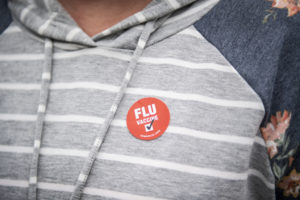
Remember the flu?
It still exists.
And you still should get an influenza vaccine this season.
“The flu has not gone away,” said Russell Lampen, DO, division chief for infectious disease for Spectrum Health. “And like all viruses, it is still looking for susceptible individuals to infect.”
The COVID-19 pandemic, of course, has hogged the virus spotlight for a year and a half.
And last year, influenza numbers fell to remarkably low levels.
But don’t let that lull you into a sense of complacency about the danger posed by flu viruses.
“The lack of influenza last winter was sort of a pleasant surprise and byproduct of widespread masking, social distancing and, likely, increases in remote learning,” Dr. Lampen said.
“As we come into a new fall season and a new winter season where masking is less prevalent and where kids are going to be back in person in school, my concern is that we are going to have increasing rates of influenza again.”
Most people recover from an influenza infection at home. But it can cause severe illness, requiring hospitalization.
“It’s important to remember that people die of influenza every year,” Dr. Lampen said. “On average, we will see 25,000 to 35,000 deaths per year (in the U.S.) from influenza.”
Similar symptoms
Every year, it’s important to get the flu vaccine and prevent influenza illnesses. But this year, it matters more than ever.
“Our health systems are completely overburdened right now,” Dr. Lampen said. “Some of this is related to COVID-19. Some of it’s related to just general health care right now.
“But the hospitals are full. We need to do everything we can do to keep people healthy and out of the hospital.”
The flu and COVID-19 share many symptoms, such as coughing, runny nose, headache, body aches and fever.
Preventing the flu could reduce the likelihood you would have to potentially self-isolate while seeking COVID-19 testing, Dr. Lampen said.
Each year, federal health agencies adjust the flu vaccine to better match the influenza virus strains expected to circulate in the U.S.
Even if the vaccine is not a perfect match, it still can be helpful, doctors say.
Those who get the vaccine—and later come down with the flu—tend to have less severe illness and recover more quickly.
Some people worry the flu vaccine could cause a flu illness. But that is not the case, said Rosemary Olivero, MD, a pediatric infectious disease specialist with Spectrum Health Helen DeVos Children’s Hospital.
People may experience short-term side effects after a vaccination—such as a sore arm or fatigue. But that is just a sign of the immune system gearing up to fight the virus.
“It’s normal and expected—and it’s way better than getting the flu,” Dr. Olivero said.

 /a>
/a>
 /a>
/a>
 /a>
/a>
Is it OK to get the flu vaccine and the Covid booster on the same day or should I do it at least a week apart?
Hi Carol, Thank you for your question. Generally, yes, you may schedule and receive the COVID-19 booster and the flu shot at the same time. With that said, the Centers for Disease Control and Prevention suggests speaking with a health care provider if you have concerns about getting both vaccines at the same time. Wishing you all the best.